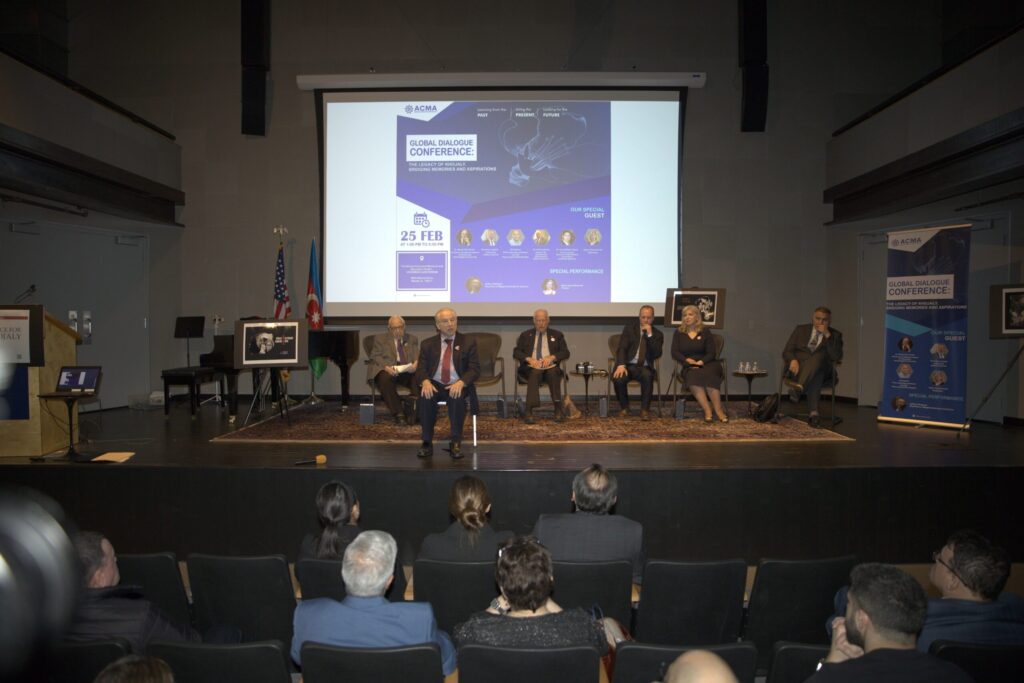Khojaly genocide
Khojaly was Azerbaijani town situated within administrative borders of Nagorno Karabakh region of the country, on the road Agdam – Shusha, Khankendi (Stepanakert) — Askeran near the only airport of the region. Its population constituted over 7 thousand people. Because of its communication advantage of harboring the civil airport just before the start of Nagorno-Karabakh conflict it had become shelter for refugees. Meskhetian Turks who fled the bloody inter-ethnic clashes in Central Asia as well as Azerbaijani refugees deported from Armenia came to Khojaly.
In February 1992, an unprecedented genocide was committed against the Azerbaijani population in Khojaly. This bloody tragedy, which became known as the Khojaly genocide, involved the extermination or capture of the thousands of Azerbaijanis; the town was razed to the ground. Over the night from 25 to 26 February 1992 the Armenian armed forces with the help of the infantry guards regiment No. 366 of the former USSR implemented the seizure of Khojaly – a small town situated in the Nagorno-Karabakh region of the Republic of Azerbaijan with the total area of 0.94 sq. km. and the population before the conflict of 23,757.
The inhabitants of Khojaly remained in the town before the tragic night (about 2500 people) and tried to leave their houses after the beginning of the assault in the hope to find the way to the nearest place populated by the Azerbaijanis. But these plans have failed. Invaders destroyed Khojaly and with particular brutality implemented carnage over its peaceful population.
Brutal annihilation of hundreds of blameless in- habitants of Khojaly was one of the most heinous crimes during the armed conflict in and around the Nagorno-Karabakh region of the Republic of Azerbaijan. The Armenian armed forces and foreign military units spared virtually none of those who had been unable to flee Khojaly and the surrounding area. As a result, 613 persons were killed, including 106 women, 63 children and 70 elderly people. 1,275 inhabitants were taken hostage, while the fate of 150 persons remains un- known to this day. In the course of the tragedy 487 inhabitants of Khojaly were severely maimed, including 76 children not yet of age. 8 families were completely wiped out, 25 children lost both parents, and 130 children one of their parents. Of those who perished, 56 persons were killed with especial cruelty: by burning alive, scalping, beheading, gouging out of eyes, and bayoneting of pregnant women in the abdomen.
Armenian officials deny their responsibility for the crimes committed during the conflict, including against the population of Khojaly, airily falsifying facts and sharing own interpretations of them, which deviate not only from reality but also from elementary logic. Nevertheless, even the subtlest propaganda will never manage to disprove the facts that speak of a situation diametrically opposite to that represented by the Armenian side.
Apart from the considerable information in possession of the law-enforcement agencies of the Republic of Azerbaijan, the responsibility of Armenia is documented also by numerous independent sources and eyewitnesses of this tragedy.
Recognition
The Khojaly genocide is among the most tragic human tragedies of XX century like Khatyn, Hiroshima, Nagasaki and Songmi. The tragedy happened at the end of the century was not only against the people of Azerbaijan, but it is one of the gravest crimes against humanity. Iinternational conventions adopted in the world, universal laws, repeatedly condemned tragedies like the tragedy of Khojaly genocide and stated its unacceptability. Azerbaijan has taken decisive steps in many international organizations, parliaments of the world for international political and legal assessment of this crime against humanity committed in Khojaly by Republic of Armenia.
“Justice for Khojaly” campaign
The world’s second largest international organization in terms of its membership, the Organization of Islamic Conference (Note: on 28th June of 2011 by the decision of the Council of Ministers of Foreign Affairs of member-countries the name of the organization has been changed to Islamic Cooperation Organization (ICO) has repeatedly condemned aggression of Armenia against Azerbaijan Republic and expressed solidarity with the people of Azerbaijan in the conflict between Armenia and Azerbaijan. In 2004, the Organization of Islamic Conference established the Youth Forum for Dialogue and Cooperation. Forum also applied to the International Youth Movement, in the autumn of 2007 at “Youth stands for Alliance of Civilizations” Initiative, which was founded within the framework of “Alliance of Civilizations” and offered via its partners, international organizations to raise international awareness about provocative actions of the regime that shed a blood of the peaceful Azerbaijanis. These ideas were in the proposal that the Nagorno-Garabagh conflict should be considered as a conflict that can lead to potentially worsening of the relations between civilizations. The proposal also stated that the policies of Armenian President Serzh Sargsyan, who came to power in Armenia, may lead to the serious violation of the stability in the South Caucasus region which plays important role in world’s energy security policy.
At 6th session of the Board of Directors of the ICO Youth Forum in Kuwait in April 2008, the Head of Heydar Aliyev Foundation’s Representation in Russia Leyla Aliyeva was elected as the first general Coordinator of the Forum on the issues of intercultural and dialogue among civilizations. It played significant role in drawing attention by the ICO Youth Forum on the occupation of Azerbaijani territories by Armenia. As a result of a two-day meeting of experts organized by of ICO and ISESCO in the same year in Istanbul on May 17 the ICO Youth Forum, the campaign initiated by Leyla Aliyeva, the “Justice for Khojaly – Liberation for Karabagh” supported by ICO experts and it was decided to mark 26th of February as the Day of tragedy the victims of humanitarian disasters in the countries of the ICO. In addition, it was agreed to submit to the meeting of the ICO ministers a proposal on inclusion of the Khojaly genocide in textbooks on Islamic countries.
At Kampala (Uganda), at ministerial conference of ICO member countries the initiative of General Coordinator for the Alliance of civilizations of the Youth Forum Leyla Aliyeva “Justice for Khojaly – Freedom to Garabagh” was approved. At the 35th session ICO foreign ministers conference the special resolution was adopted. Support of the resolution by the foreign ministers of 57 countries led to the establishment of political and legal framework in the world for the implementation of this campaign.
According to the resolution, Day of Memory of victims of humanitarian tragedies was established at the ICO member-states. The resolution states that besides the approval of list of tragedies, including Khojaly tragedy, the campaigns should be carried out for dissemination of right information on humanitarian disasters faced by the peoples of the Muslim countries in the twentieth century, about aggressions and ethnic cleansing.
Upon the initiative of Leyla Aliyeva, General Coordinator for Intercultural Dialogue of Organization of Islamic Conference (OIC) member-body of the Islamic Conference Youth Forum for Dialogue and Cooperation “Justice for Khojaly” international information campaign announced on May 8, 2008 has been started . The first event within the framework of the campaign was the exhibition of the photographs taken by children in connection with the Khojaly tragedy and photos of a foreign country’s youth in Istanbul, in “Taksim” metro station. In May 2009 at the 36the ministerial conference of Council of Ministers of Foreign Affairs of the ICO held in Damascus, Syria the ministers fully supported the campaign carried out by the Youth Forum on the “Justice for Khojaly – Freedom to Garabagh” and it was included in the final resolution, and members-countries were called to participate actively in this campaign.
In 2011 the Parliamentary Unions of the Organization of Islamic Conference (PU OIC) adopted declaration in support of the international campaign initiated by Leyla Aliyeva “Justice for Khojaly”. At the 13-th session of the Council of ICO Council of Parliaments held in the United Arab Emirates (UAE) capital Abu Dhabi, the Abu-Dhabi declaration adopted by member states calls for recognition the Khojaly tragedy as a crime committed against humanity. This was a result of the initiative of the Youth Forum of OIC “On Cooperation between YF of ICO and Parliamentary Unions of ICO”. It was noted in item 3 of the resolution that PU of ICO member- parliaments recognize massacre in town of Khojaly of the Republic of Azerbaijan committed by Armenian armed forces against the peaceful Azerbaijani population as a crime against humanity. The member states call to assess the crime at the national level.
There is a direct call to the parliament-members of organization and this, in turn, can lead to legal and political recognition of the tragedy at the national level.
On January 30, 2012, at the 7th session of the Parliamentary Union of Islamic Cooperation Organization member states (PU ICO) held in Indonesian Palembang city traditionally adopted a resolution “On aggression of the Republic of Armenia against the Republic of Azerbaijan” a special item was added on the initiative of the Youth Forum of ICO. The paragraph devoted to Khojaly tragedy, stated that the parliaments of the conference member-countries calledrecognition of Khojaly genocide that took place on February 26, 1992 as genocide committed by the armed forces of Armenia against the peaceful Azerbaijani population in accordance with the nature of the mass extermination, and demanded to bring to those responsible to justice.
The campaign makes use of a variety of communication tools and resources to reach out globally and deliver its message, particularly through the media, Internet and live events. Events organized within the framework of the campaign are designed to demonstrate strong opposition to massacres, ethnic cleansing and racial, ethnic or religious discrimination, express solidarity with the victims of the Khojaly Genocide and to underline the need for a fight against impunity for the crimes committed against Azerbaijani civilians in Khojaly.
To date, more than 120,000 people and 115 organisations have joined this campaign, which functions successfully in dozens of countries. Social networks, exhibitions, rallies, contests, conferences, seminars and similar activities are other effective tools promoting its goals.
Source:
www.justiceforkhojaly.org
www.virtualkarabakh.az





